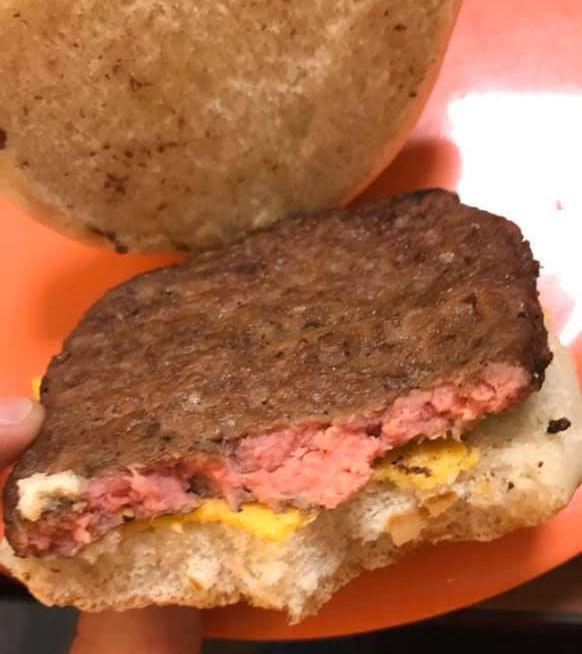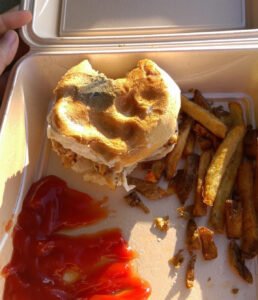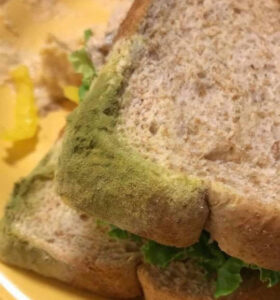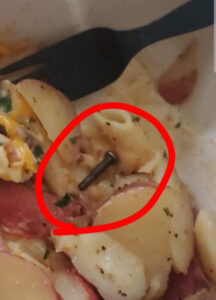




11/14/2019
Hallie Lauer | news editor
Last Thursday, Nov. 5, a post from senior music education major Sharon Cowdery made its way around the various Facebook pages for Duquesne students. The objective of the post was to “gather evidence that Duquesne University’s food is not a reliable source of safe food to eat.”
“Over the past three weeks [I’ve] consistently been getting spoiled or undercooked food, and it was bothering me,” Cowdery said in an interview. “I’ve never really loved the food, especially in Hogan, but it’s never been unsafe to eat until now.”
The post contained photos of undercooked chicken, pizza dough and burgers and moldy bread, as well as bugs in salads and even a screw found in some potatoes. But according to Cowdery, the problems didn’t stop there. She mentioned she had also consistently been seeing spoiled fruit and other produce in the Hogan Dining Center.
According to the most recent Allegheny County Health Department inspection, which occurred on March 3, 2019, The Incline had four violations, with three of them being a low-level risk and one
being a medium risk.
The violations come from the areas: Food Source/Condition, for damaged containers holding food; Cooling Food, for a lack of food cooling charts; Contamination Prevention, for items in the salad/deli area not being wrapped and finally in Fabrication, Design, Installation and Maintenance for cracked caulking.
Cowdery went on to say that she feels that the Hogan Dining Center is where the biggest problems lie, although some of the photos she has provided were taken of food from The Incline and from Tower’s Campus Market.
The most recent health inspection done on the Hogan Dining Center was on April 17, and found seven violations — four low-risk, three medium, and one high-risk. The high risk threat comes from the Cold Holding Temperatures, where cream cheese and whipped cream were stored at a temperature above the safety number.
Hogan Dining Center’s violations come from: Food Source/Condition for bulk containers not being labeled on the outside; Cold Holding Temperatures, for cream cheese and whipped cream being stored at a temperature above what is deemed safe; Date Marking of Food, for deli meats being improperly marked; Cleaning and Sanitization, for the dishwasher not sanitizing and reading improper water temperatures; Waste Water Disposal, for a leaking handwashing sink; Toxic Items, for a fruit fly strip hanging in the dish room and Contamination Prevention, for apples without wraps or protective covering.
Despite the violations, there was never a consumer alert for either dining area posted, as the risk was still considered to be low-level. According to the reports, most issues were remedied while the inspector was still on the premises.
After the popularity of the post, Duquesne Dining, as well as SGA President Charlie Megginson, reached out to Cowdery to try and remedy the problem.
“After becoming aware of Sharon’s concerns I immediately scheduled a meeting with Scott Richards, assistant vice president for auxiliary services, and Dave Manz, district manager for Parkhurst Dining,” Megginson said. “We discussed her concerns as well as the other issues presented in subsequent social media posts.”
Across the two Duquesne specific pages, as well as Cowdery’s personal Facebook page, the post garnerd 176 comments and 61 shares from current students, parents and alumni.
“[I] had no idea so many other students were feeling this way,” Cowdery said.
In the past, Cowdery was the president of the Duquesne Chapter of The National Band Association and was unhappy with the time it took the SGA to pass her constitution. This was part of the reason that she took to social media with her concerns.
“I’ve worked with SGA in the past and it took a long time to get things done — having that experience I didn’t trust the system to get things done promptly,” Cowdery said. “All I care about is getting food [that is] safe to eat.”
According to Manz, Duquesne Dining follows the National Restaurant Association’s ServSafe program. ServSafe is a national program that trains restaurant managers in proper food handling and safety.
According to their website, more than 4 million restaurant managers have been certified through their program. All of Duquesne’s chefs and managers are certified through this program, according to Manz.
“Duquesne Dining is committed to ensuring both food safety and good food quality. We consistently work to meet the required ServSafe program standards, and we also implement additional training on proper food preparation methods at every station,” Manz said. “It’s important to note that every concern that is brought directly to Duquesne Dining … is dealt with quickly and thoroughly.”
“In my experience as Student Government president, I have found Parkhurst Dining to be extremely responsive to student concerns. The Student Government’s Food Service Committee meets with Parkhurst management and university administration regularly,” Megginson said. “Additionally, Parkhurst and the student government operate suggestion boxes in all campus dining locations.”
Cowdery went on to say that she doesn’t believe it is a Parkhurst issue but rather a Duquesne issue.
“I’ve talked to some adults who say that Parkhurst provides food for their workplace with no issue. I don’t want to assume, but I think it’s the [Duquesne] workers mishandling,” Cowdery said.
One week after Cowdery’s post went live, she met with Duquesne Dining. In a follow up Facebook post, Cowdery said that she and Duquesne Dining have come to some conclusion about where the issue lies and how to resolve it.
“They [Duquesne Dining] recognize a hierarchy/chain of communication breakdown between the staff/workers we see in Hogan and Incline, versus the management behind the scenes who address concerns,” Cowdery posted. “Ideally, when an issue is presented to a staff worker, it should immediately be brought to management so the issue can be resolved. As many of you shared, this isn’t happening, and much of our concerns go unresolved. In addition, the staff aren’t always held accountable for not following procedures because the management doesn’t know about these problems.”
Cowdery went on to say that she has been assured by management that procedures are going to be reviewed to see if they can be improved upon, and they plan to look for ways that the communication issue can be fixed, in order for them to be more “proactive, rather than reactive, to student concerns.”
“Any concerns brought to our attention are a priority that we take seriously, investigate and address in a timely manner,” Manz told The Duke.
“I encourage all students to take advantage of the resources provided. The Student Government Association exists to act as a liaison between the student body and the administration. Our Food Service Committee is dedicated to hearing student concerns and working with Parkhurst to ensure that we have access to healthy, safe and high-quality foods,” Megginson said.
Duquesne Dining can be reached with any concerns via their email, dining@duq.edu, through direct message on any of their social media, through the FoodU app or by the suggestion boxes in every dining center.
